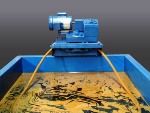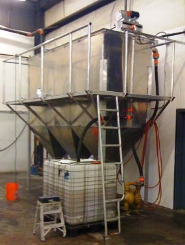
Case Study: Tank Washing Facility Installs Oil Recovery System
- By Kara Dennis
- Apr 01, 2011
Food Express, Inc. has been transporting food-grade products for 27 years, and the company prides itself on providing the best customer service in the business. With several locations and equipment stationed throughout the Northwest, the company has the flexibility to meet the needs of bulk-product shippers across the country.
In addition to its transportation services, Food Express operates a food-grade tank-washing facility in Vancouver, Wash. A customer recently required the washing of food-grade oil tankers, which resulted in oil-contaminated wastewater. The city of Vancouver required Food Express to treat the wastewater to meet municipal discharge regulations or risk being shut down.
While searching the Web for waste oil recovery solutions, Food Express President Walt Keeney came across Oil Skimmers, Inc., a company that has been manufacturing floating tube-type oil skimmers for more than 40 years. These skimmers have a specially formulated, closed-loop tube that floats on the surface of liquid and attracts oil, which adheres to the outside of the tube. Keeney was familiar with wastewater treatment and knew that an oil skimming system could be the perfect solution.

Keeney designed and built his own aluminum separation and holding tank, which has a capacity of 2,500 gallons, and attached a Model 5H Oil Skimmer using a pre-fabricated mounting system created by the manufacturer. Model 5H has an oil-covered tube that is continuously drawn up into the skimmer where scrapers remove the waste oil, which drains into a containment drum or other vessel. According to Keeney, the skimmer removes about 200 gallons of oil per week, but this amount varies based on the number of oil tankers that the company services. The solid waste is removed from the tank, after it settles to the bottom.
“It’s an excellent piece of equipment as far as we’re concerned,” Keeney said. After the installation, “the waste stream has an almost non-detect when we do analysis, which means there is no detectable oil in the water, even when we run hard all day doing oil tankers and dry bulk flour and starch trailers.”
Food Express takes the recovered oil and sells it to a farmer who works in the biodiesel industry. By recycling, the company prevents the oil from ending up in a landfill and can say its operation is environmentally friendly.
Keeney concluded: “We’re happy, the city of Vancouver is happy – it’s a win-win situation.”
About the Author
Kara Dennis is a marketing assistant at Oil Skimmers, Inc.